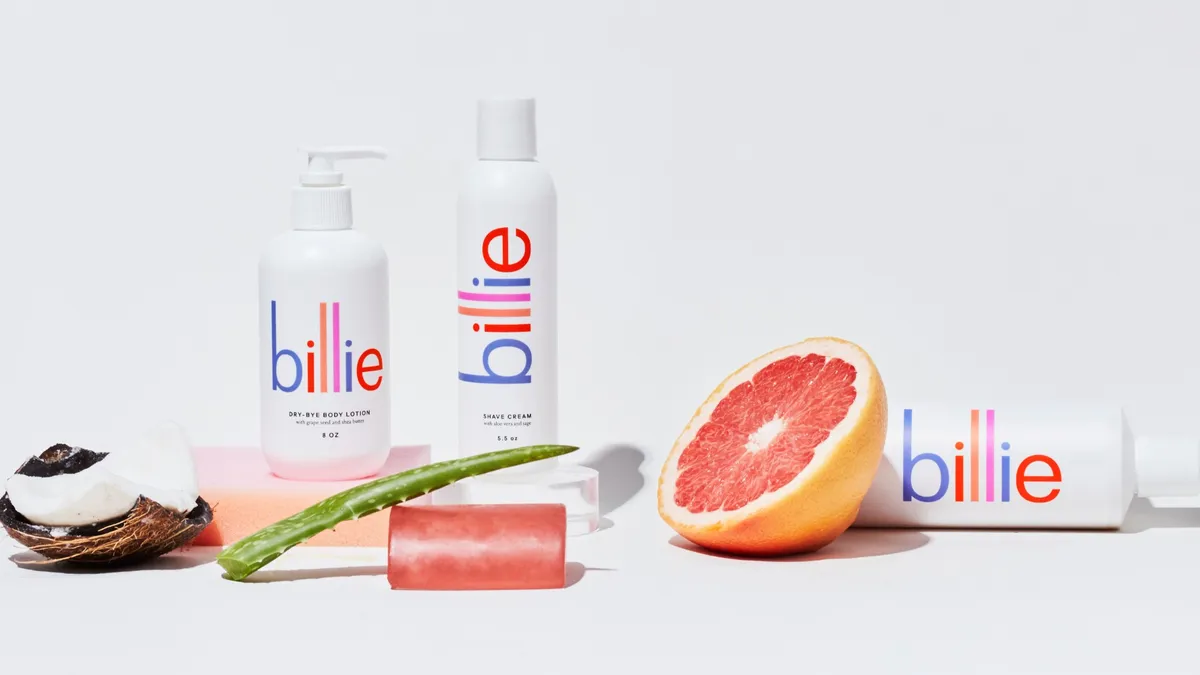UPDATE: January 6, 2021: The Federal Trade Commission on Tuesday hailed the mutual decision by Procter & Gamble and Billie to call off their deal. FTC antitrust chief Ian Conner called it "good news for consumers who value low prices, quality, and innovation" and said that the "The FTC voted to challenge this merger because it would have eliminated dynamic competition from Billie." The companies in an emailed joint statement said they were "disappointed" but decided it's in their "best interests not to engage in a prolonged legal challenge, but instead to terminate our agreement and refocus our resources on other business priorities."
Dive Brief:
-
The Federal Trade Commission on Tuesday said it has filed an administrative complaint and authorized a federal lawsuit to block Procter & Gamble's acquisition of women's shaving startup Billie. The consumer products giant moved to buy Billie in January for an undisclosed amount.
-
The FTC's rationale is that "the proposed acquisition would eliminate substantial and growing head-to-head competition between P&G and nascent competitor Billie in U.S. wet shave razor markets," according to an agency press release.
-
In an emailed statement, a P&G spokesperson said, "We were disappointed by the FTC's decision. We are considering our options in light of the decision and do not have any further comments at this time." Billie didn't immediately respond to a request for comment.
Dive Insight:
With this move, the FTC continues its effort to preserve the competition the agency says has been sparked by the disruption in the shaving market.
Billie's pitch to the consumer, in fact, has been leveled squarely at personal care giants like P&G, which the brand says charges more for women's shaving products than for men's. "On behalf of the razor companies out there — we're sorry you've been overpaying for pink razors," the company says on its site. "It's time you got some money back."
Research has borne that out. A 2015 report from the New York City Department of Consumer Affairs, for example, found that products marketed to women cost more than comparable items aimed at men 42% of the time, while men's products cost more 18% of the time, and that women pay 13% more for personal care products.
Billie's positioning on this so-called "pink tax" attracted millions in venture capital funding, including from Goldman Sachs, before catching P&G's attention after just two years in business.
"Billie saw an opportunity to challenge P&G's position as the market leader by finding underserved, price and quality conscious customers, and building an innovative brand," Ian Conner, director of the FTC's Bureau of Competition, said in a statement. "As its sales grew, Billie was likely to expand into brick-and-mortar stores, posing a serious threat to P&G. If P&G can snuff out Billie's rapid competitive growth, consumers will likely face higher prices."
P&G's interest likely goes beyond neutralizing its competition, however. Billie, like similar men's brands Harry's and Dollar Shave Club, caters to younger consumers and enjoys rich troves of data thanks to its direct relationship with customers.
Dollar Shave Club, whose disruption, like Harry's, upends the "cheap razor, expensive blades" sales model of longtime brands like P&G's Gillette and Edgewell's Schick, was bought four years ago by consumer products giant Unilever for $1 billion, without FTC objection. A proposed $1.37 billion acquisition of Harry's by Edgewell, which also runs shaving brands Wilkinson Sword, Edge, Personna and Skintimate, was, however, blocked by the FTC in February.
The consumer products companies on their own can achieve some of what they hoped to acquire from these smaller brands, including direct sales and consumer data, retail consultant Matt Sargent said earlier this year regarding the failed Harry's takeover. It's the new brands, with slimmer resources, that may struggle without a parent to help them scale — in which case the competition they have provided in the market could fade.












